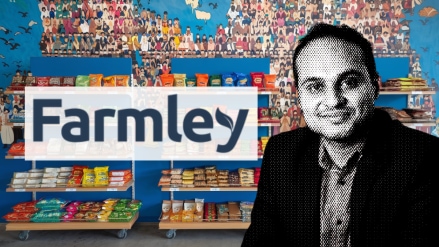“The brands dominating shelves today may not even exist tomorrow,” Akash Sharma, co-founder, Farmley told financialexpress.com. He’s not wrong, with another trend popping up on social media every day, brands rise and fall like flavours in a seasonal menu. What sells today may be forgotten tomorrow, buried under the next wave of wellness trends and influencer-driven hype.
Sharma grew up watching how the right kind of value addition could change the fortunes of farmers. “We used to sell mustard seeds at Rs 15-20 per kg. But when we processed them into mustard oil, we were selling at Rs 60-70 per litre,” he recalls. That simple but powerful realisation—turning raw produce into a consumer-ready product—stayed with him, even when he ventured into the corporate world.
In 2017, Sharma and his co-founder launched Technify Biz, a B2B agri-tech platform aimed at helping farmers increase their incomes by streamlining the supply chain. They worked closely with over 500 farmers, setting up processing units across India for makhana in Bihar, raisins in Sangli, and cashews in Mangalore. Their model attracted big retailers like Reliance and D-Mart, who sourced white-labeled dry fruits from them. But despite their success, one uncomfortable truth lingered: consumers neither knew nor cared about where their dry fruits came from, let alone whether they were pure or adulterated. Farmley reduced its losses to Rs 26 crores in FY24, compared to Rs 33 crores in FY23, as per data from the market intelligence platform, Tofler. The company’s revenue from operations grew to Rs 230.21 crores, up from Rs 169.83 crores the previous year.
“We realised that despite building a cleaner, more transparent supply chain, we were just another supplier. The customer still wasn’t aware of the difference,” Sharma noted. The solution? A brand of their own. In 2021, Farmley was born—a name that claimed to blend the promise of farm-fresh sourcing with a modern, consumer-friendly identity. Their timing was impeccable. Health-conscious snacking was on the rise, but the challenge wasn’t just about offering ‘better-for-you’ foods. “Taste is non-negotiable. If a product isn’t tasty, no matter how healthy it is, people won’t eat it,” Sharma added. This insight drove Farmley’s pivot—from plain almonds and cashews to innovative products like Panchmeva (a mix of five superfoods) and roasted Makhana Munchies, a crunchy alternative to junk food.
Still, breaking into the Indian snacking market—a space dominated by brands like Happilo, Yoga Bar, and Tata Sampann—wasn’t easy. Farmley needed a moment that would make consumers sit up and take notice. That moment came in 2023 with a marketing campaign featuring Rahul Dravid, using a tennis ball as a metaphor for dry fruit adulteration. “People finally understood why purity mattered,” Sharma said. Even though the campaign might have given Farmley a credibility boost, pricing remained a critical challenge.
“In India, price sensitivity is huge. At a Kirana store, customers want a Rs 20 snack. In supermarkets, they might pay Rs 190-300 for a premium product,” Sharma explained. Striking the right balance between affordability and quality wasn’t just about brand positioning—it was about survival. Today, Farmley’s revenue split reflects this strategy: 70% of sales come from e-commerce or online channels, while retail and traditional trade are steadily growing with a 30% share. Sharma expects general trade, currently the weakest channel, to become profitable within two years.
The recent reduction in import tariffs on dry fruits is another market shift Farmley is watching closely. While cheaper imports might seem like a threat, Sharma views them as an opportunity. “If almonds become cheaper, our products—like Date Bites and Panchmeva—also become more affordable. It helps the entire healthy snacking industry,” he pointed out. Profitability is another rare feat in India’s FMCG sector, and Farmley takes pride in being EBITDA positive even as it aggressively expands. Sharma envisions the brand growing beyond dry fruits and makhana into chocolates, kids’ snacks, and even peanut butter—essentially, every category where indulgence meets health. Already, Farmley claims market leadership in flavoured makhana and is “very close” in healthier desserts. In dry fruit mixes, however, Sharma admits the market is too fragmented to crown a leader. “We probably hold 3-5%,” he conceded.
An IPO is on the horizon, though Sharma remains cautious about overextending. “The industry is growing fast, and we’d be foolish not to keep pace. But the goal is aggressive growth while staying profitable,” he said. That balance—between scaling up and staying sustainable—is what will determine whether Farmley becomes a lasting brand or just another name that faded when the next snacking trend took over.
